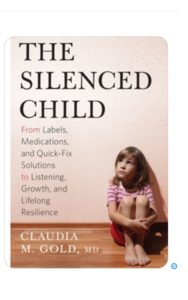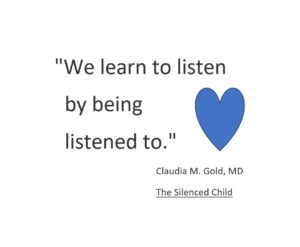After two moves in six months I am starting to read again. With vigor and passion and enthusiasm. Last night, I took about five books with me while I ran a tub to decide which would be next.
So now, I’m 50 pages into The Silenced Child by Claudia M. Gold, MD and am DEVOURING it. It’s SO good.
Here’s what I shared over at the Parenting with ACEs page earlier today.

“Listening to parents help them listen to their children. Listening to children, in turn, has been shown to modify the way a child responds to stress, and protects against long-term negative effects of stress on the brain and on the body.”
This includes listening about adverse childhood experiences.
Listening, all by itself, the author writes over and over and over is HELPFUL and HEALTHFUL even if nothing else is done. Listening is doing. It’s not passive. It’s not nothing.
It’s essential, useful and promotes health.
Listening = GOOD!
It’s really nice to hear a doctor say this even though, as patients of any kind, we already know this. We feel it. When we talk about heard we feel this is accompanied by smiling and feeling connected and hand over the heart. It makes us breathe better.
“We learn to listen by being listened to.”
Again, this might be common sense but it doesn’t seem to be given how listening is often in short supply, especially when we are in the presence of medical professionals.
For those of us with ACEs, who have had the body, brain and feelings ignored or manipulated, who have had our body cues and signals and maybe our actual words, denied, being heard is profound. PROFOUND.
If we don’t get this listening in the home, we need to get it at school, with friends, with pets, with crafts, wit h teachers, with professionals and as often as possible.
h teachers, with professionals and as often as possible.
How can we possibly come to parenting knowing how to listen if we’ve never been heard? How can we come to parenting knowing how to acknowledge and work with and through pain if we’ve never had that done? How do we know that doing that with other people makes it easier if, for us, it is other people who have caused our emotional pain as children?
It’s understandable that we are tad bit confused sometimes.
Listening, tuning in, holding space and all “that stuff” is learned by doing, learned by practicing and so, if we’ve lacked this as children we need a whole heck of a lot of practice as adults.
And we need to practice it both when we are in pain but also, just in general and even when we are in joy.
That’s why I love all the trendy gratitude crap. It’s not crap. It helps us pay attention to, note, ingest and absorb good stuff. This, for some of us, also has to be learned. This, for lots of us, is not the worst thing in the world to learn. In fact, if we could learn to do this AS WELL AS learning how to be with and express and take in pain, we might be a little bit less of feelings.
As adults and as parents teaching our kids about this life stuff.
SO MUCH of the parenting advice available tells parents what to do and how to do it and what we are doing wrong. And lots of that is totally ignored.
Lots of times it’s ignored because those giving the advice haven’t listened to us or people like us and we know and feel that. So we don’t listen either. To them. They don’t speak with us or to us or for us because it’s clear that they haven’t heard us. It’s clear by the advice they give.
Ex. Has anyone really ever had an unhealthy snack because they simply didn’t know and weren’t educated on the fact that maybe a piece of fruit is a healthier option? I don’t think so. I don’t think that’s the big issue at play when we go reaching for something.
And with parenting advice if we are doing junk food parenting it’s not just because the fruit bowl is empty.
Likely, we are overwhelmed or stressed or unable to make better choices for nine trillion reasons.
One is that there are almost no places to speak about our experiences as parents who are parenting. Let me re-phrase, we can talk casually and conversationally all over the place, when things are adorable, cute or when there are small mishaps.
But when things are hard, messy, complicated or epic angsty… it gets much harder fast.
“Parents who say, ‘I don’t want to raise Charlie the way I was raised,’ do not need “expert” advice. They need to develop confidence in their natural intuition. The goal is to support parents’ efforts to find a way of raising their children that is in keeping with themselves, with each other, and with their child.”
Where can this happen? How does this happen?
If there are emotional or behavioral or ACE related issues, in us, as parents… where do we talk about this? We might have and like therapy. Many of us do or have found some “paid for parenting” in exchange for cash. I have. For decades. However, for many it’s also not at all appealing, affordable, practical or effective. Plus, having to pay to be heard isn’t exactly the same as being heard by someone who does it for free, by choice and only from love.
We need places to share as peers and as parents and as people in treatment.
When we can just share and own reality as we’ve experienced it.
“Children develop resilience when their struggles are acknowledged – but not erased – through the inevitable stresses of life.”
This is true for adults, too. Too often “mere” acknowledgement is skipped over.
How many of us doing this ACEs work have had been asked by professional helpers about how hard, dangerous, difficult and potential triggering it is for us to bring up the ACEs stuff.
“Who is really hard for?” I usually reply.
For someone who has lived a childhood with adversity, it’s not being “brought up” by conversation it’s maybe be brought into the open or even, so that it can, in fact, be “put down.”
The trouble for many with talking is that it’s hard for the person who is listening not the person with the ACEs.
I understand this.
When my friend Eric’s wife died, he was in his early 30’s as was she. For a time, I avoided asking about his sadness or his grief. I finally asked, “Is it o.k. to ask about it?” I confessed I was afraid of bringing it up in case he wasn’t thinking about it.
in his early 30’s as was she. For a time, I avoided asking about his sadness or his grief. I finally asked, “Is it o.k. to ask about it?” I confessed I was afraid of bringing it up in case he wasn’t thinking about it.
He said, “I’m always thinking about it. All of the time,” and in fact, so few of his peers had experienced the loss of a spouse that he was lonely with his grief.
I realized it was me that didn’t want to talk about it and that I was protecting me, not him. Is that what doctors and others do when they avoid talk about childhood adversity or the ways in which it might impact our mood, health and parenting?
Someone in emotional pain is rarely hurt by having it acknowledged and at least being invited to speak about it.
Is it the disease model that confuses us? Is it because of the way pain is considered pathology to many, especially as it relates to trauma? As though trauma hasn’t been around as long as humans have lived? As if it isn’t everywhere in fiction, poetry, music, song and history?
But back to this amazing book which directly and indirectly affirms that having the option of talking about our actual lives and experiences has a positive impact our health, mood and parenting.
Gold writes:
“Both psychoanalysis and Buddhism maintain that it is the presence of mind of another person that is responsible for healing emotional pain. Being with and bearing witness are often phrases that describe this phenomenon. When we leap to take-or prescribe-a pill we run the risk of skipping this step.”
I love her writing and way of thinking so much.
Gold writes, “Parents are the original neuro-architects. When a child is struggling whether with sadness, anxiety or explosive behavior, a parent’s “presence of mind” helps that child to make sense of and manage his own strong emotions. Parents themselves need to be supported so as to recognize what their child is experiencing, and be with their child in a way that promotes healthy emotional development.”
Some of us, as parents, didn’t get this as children. We didn’t get it with our own parents and so, this being present and with feelings may feel intuitive, at the gut level, but that doesn’t mean we have a lot of trust or skill or grace when we try it out.
We need safe places that are non-clinical and don’t come with a diagnosis where we can explore, learn and share (which is why I’m just crazy about this book and all the peer, parent, survivor and peer led or co-led groups, programs, non-profits and initiatives.
“Parents may experience terrible shame about their own behavior. Parents share this kind of information only when they feel safe. Safety comes when there is time and space for nonjudgmental listening. When parents can make sense of their child’s behavior, they are in an ideal position to support that child in managing her unique vulnerabilities.”
Yes!
“This requires bringing into awareness the way their child’s behavior may provoke their own difficult feelings, and in a sense moving these feelings out of the way. They can help their child to name feelings, identify provocative situations, and develop strategies to manage these experiences. It is the responsibility of the parent, not the child, to make sense of and find meaning in the behavior. The experience of anxiety is then incorporated into that child’s emerging sense of self in a healthy way.”
Yes!
“However, the disease model of biological psychiatry may lead us to try right away to get rid of the symptoms, often with medication alone, without treating the underling cause.”
Hell Yes!
O.k., one last one for today .
“When we place the problem squarely on the mother (parent), without opportunity to explore and understand the social, cultural and relational context, we are in effect communicating, ‘There is something wrong with you and I will fix it.”
This does not empower people. This does not make people feel seen and heard. This makes many of us wary of professionals and/or it makes us feel fundamentally flawed and broken. Feeling fundamentally flawed and broken, is a hard place to parent from – and feeling that others view as that way is double-whammy awful. What we need our spaces and places to understand context and to deal with reality.
Much of it is happening, now, online and it’s thrilling.
You Matter Mantras
- Trauma sucks. You don't.
- Write to express not to impress.
- It's not trauma informed if it's not informed by trauma survivors.
- Breathing isn't optional.
You Are Invited Too & To:
- Heal Write Now on Facebook
- Parenting with ACEs at the ACEsConectionNetwork
- The #FacesOfPTSD campaign.
- When I'm not post-traumatically pissed or stressed I try to Twitter, Instagram & Pinterest.
Speak Your Mind